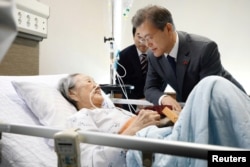South Korea is considering abolishing the fund Tokyo paid into as part of the landmark 2015 agreement to resolve a lingering dispute over Japan’s wartime sexual slavery of women. The government said it will deliver its decision on the matter soon and what it plans to do with the roughly $9 million in it.
However, whatever plans Seoul has are likely to run afoul of the wishes of many surviving victims of Japan’s wartime sexual slavery, widely referred to as “comfort women.”
In his bilateral summit with Japanese Prime Minister Shinzo Abe September 25, South Korean President Moon Jae-in said the Reconciliation and Healing Foundation has “failed to function properly due to objections from the comfort women survivors and the South Korean public.”
Abe urged Moon to uphold the bilateral agreement, and according to Moon’s spokesman, the president said he will neither abandon, nor demand its renegotiation.
But Moon’s decision doesn’t resonate with Ahn Shin-kwon, the head of the House of Sharing, a shelter for surviving comfort women. His group has called for the 2015 deal to be annulled or broken.
“If we use the term 'renegotiation' that means we acknowledge the previous agreement,” said Ahn, calling for the agreement to be terminated. He further criticized the administration by saying taking no further action to satisfy the survivors’ requests was passive and not appropriate, calling the women victims of war crimes.
A foundation with a problem
The Reconciliation and Healing Foundation was formed to distribute money wired from Japan to pay surviving comfort women and relatives of deceased victims, as stipulated in the 2015 bilateral agreement between Seoul and Tokyo.
South Korea’s Yonhap news agency reported there had been allegations of mismanagement in the fund’s administration and possible irregularities in selecting recipients. The situation was exacerbated when a majority of its board resigned, including the chairperson, effectively rendering it useless. To offset any money that was spent during the program, the South Korean government injected more money into the fund to cover money that was wired from Japan.
Now Seoul is left with the question of what to do with the nearly $9 million that’s been allocated for distribution.
Gender Equality Minister Jin Sun-mee said she will make the final decision on the fund’s fate soon and is considering multiple options, but did not disclose what they may be, other than the ministry would consult with survivors and undertake “unprecedented care” in making it.
Ahn told VOA his group has yet to be contacted by the government, learning of the foundation’s potential demise through local media reports.
The House of Sharing said the money should be returned to Japan, but is doubtful Tokyo would accept it, or if there’s even a mechanism for accomplishing that task.
“So, the fund should be deposited into a state-run organization and an attempt should be made to return it each year,” said Ahn.
He hopes that by doing that it would shine an international spotlight on the issue and highlight what was “wrong with the first agreement,” because time is “running out.”
Ahn has requested the government promptly take action, because the surviving comfort women are in their 90s. That request not only includes efforts to help those in South Korea, but the roughly 20 of the approximately 200 comfort women that were registered in North Korea who are believed to be still living
The ministry says it’s reviewing "multiple ideas" for the foundation’s fund, but hasn’t supplied specifics, vowing to implement projects aimed at recovering the “honor and dignity” of the survivors.
VOA attempted to get clarification from the Ministry of Gender Equality and Family on its plans for the foundation and with which survivor groups it was planning to speak with. The ministry said it could not comment on the matter while discussions were still taking place.
Birth of a new movement
Located directly across the street from the Japanese Embassy in Seoul, is the Pyeonghwaui sonyeosang, or statue of peace. It has become the symbol of South Korea’s comfort women, victims of sexual slavery in general, and the site of a weekly Wednesday protest against the Japanese government.
Ahn told VOA that after the 2015 agreement with Japan was announced, “the younger generations became angry, particularly the students.”
Currently, next to the statue is a make-shift shelter. Young men and women take turns living in it and hold a constant “sit-in” protest against Tokyo. This protest is above and beyond the weekly Wednesday event.
Jeon Ga-ram is a member of “Hope Butterflies.” That’s one of several groups that rotate in and out of the shelter. She’s been participating in the protest for two years.
“Our organization originally started out as ‘Comfort Women Statue University Students' movement'. But after 1000 days (September 24), it changed its name to 'Anti-Abe, Anti-Japan Students' Action Movement,” said Jeon.
While they’re still focused on terminating the 2015 bilateral agreement with Japan, they’ve also set loftier aspirations.
She said, “Our ultimate goal is creating a world without war,” adding, “As long as there is a war in this world, the same problem (wartime sexual slavery) will be repeated.”
Lee Ju-hyun contributed to this report.






